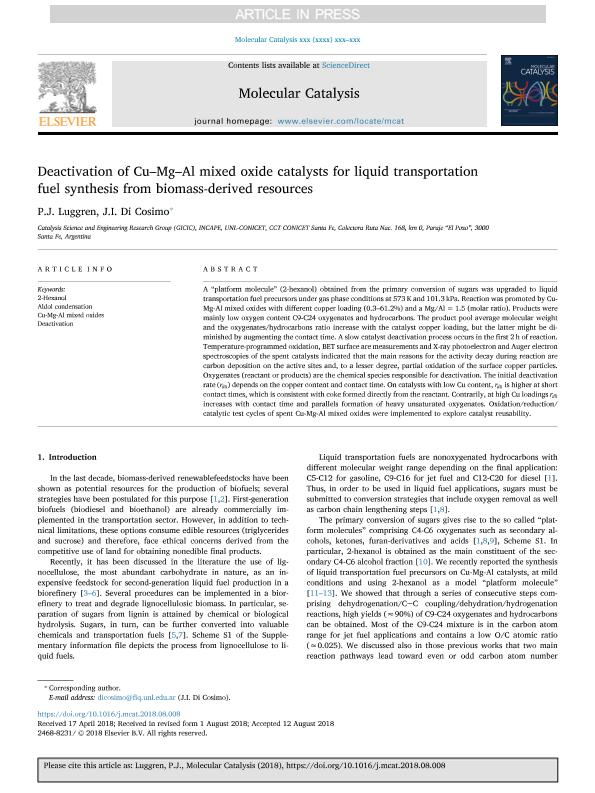Mostrar el registro sencillo del ítem
dc.contributor.author
Luggren, Pablo Jorge

dc.contributor.author
Di Cosimo, Juana Isabel

dc.date.available
2019-11-11T16:54:05Z
dc.date.issued
2018-08
dc.identifier.citation
Luggren, Pablo Jorge; Di Cosimo, Juana Isabel; Deactivation of Cu–Mg–Al mixed oxide catalysts for liquid transportation fuel synthesis from biomass-derived resources; Elsevier B.V.; Molecular Catalysis; 8-2018; 1-11
dc.identifier.issn
2468-8231
dc.identifier.uri
http://hdl.handle.net/11336/88469
dc.description.abstract
A “platform molecule” (2-hexanol) obtained from the primary conversion of sugars was upgraded to liquid transportation fuel precursors under gas phase conditions at 573 K and 101.3 kPa. Reaction was promoted by Cu-Mg-Al mixed oxides with different copper loading (0.3–61.2%) and a Mg/Al = 1.5 (molar ratio). Products were mainly low oxygen content C9-C24 oxygenates and hydrocarbons. The product pool average molecular weight and the oxygenates/hydrocarbons ratio increase with the catalyst copper loading, but the latter might be diminished by augmenting the contact time. A slow catalyst deactivation process occurs in the first 2 h of reaction. Temperature-programmed oxidation, BET surface are measurements and X-ray photoelectron and Auger electron spectroscopies of the spent catalysts indicated that the main reasons for the activity decay during reaction are carbon deposition on the active sites and, to a lesser degree, partial oxidation of the surface copper particles. Oxygenates (reactant or products) are the chemical species responsible for deactivation. The initial deactivation rate (rd0) depends on the copper content and contact time. On catalysts with low Cu content, rd0 is higher at short contact times, which is consistent with coke formed directly from the reactant. Contrarily, at high Cu loadings rd0 increases with contact time and parallels formation of heavy unsaturated oxygenates. Oxidation/reduction/catalytic test cycles of spent Cu-Mg-Al mixed oxides were implemented to explore catalyst reusability.
dc.format
application/pdf
dc.language.iso
eng
dc.publisher
Elsevier B.V.
dc.rights
info:eu-repo/semantics/openAccess
dc.rights.uri
https://creativecommons.org/licenses/by-nc-sa/2.5/ar/
dc.subject
2-HEXANOL
dc.subject
ALDOL CONDENSATION
dc.subject
CU-MG-AL MIXED OXIDES
dc.subject
DEACTIVATION
dc.subject.classification
Otras Ingeniería Química

dc.subject.classification
Ingeniería Química

dc.subject.classification
INGENIERÍAS Y TECNOLOGÍAS

dc.title
Deactivation of Cu–Mg–Al mixed oxide catalysts for liquid transportation fuel synthesis from biomass-derived resources
dc.type
info:eu-repo/semantics/article
dc.type
info:ar-repo/semantics/artículo
dc.type
info:eu-repo/semantics/publishedVersion
dc.date.updated
2019-10-23T20:56:55Z
dc.journal.pagination
1-11
dc.journal.pais
Países Bajos

dc.journal.ciudad
Ámsterdam
dc.description.fil
Fil: Luggren, Pablo Jorge. Consejo Nacional de Investigaciones Científicas y Técnicas. Centro Científico Tecnológico Conicet - Santa Fe. Instituto de Investigaciones en Catálisis y Petroquímica "Ing. José Miguel Parera". Universidad Nacional del Litoral. Instituto de Investigaciones en Catálisis y Petroquímica "Ing. José Miguel Parera"; Argentina
dc.description.fil
Fil: Di Cosimo, Juana Isabel. Consejo Nacional de Investigaciones Científicas y Técnicas. Centro Científico Tecnológico Conicet - Santa Fe. Instituto de Investigaciones en Catálisis y Petroquímica "Ing. José Miguel Parera". Universidad Nacional del Litoral. Instituto de Investigaciones en Catálisis y Petroquímica "Ing. José Miguel Parera"; Argentina
dc.journal.title
Molecular Catalysis
dc.relation.alternativeid
info:eu-repo/semantics/altIdentifier/url/https://linkinghub.elsevier.com/retrieve/pii/S2468823118303250
dc.relation.alternativeid
info:eu-repo/semantics/altIdentifier/doi/http://dx.doi.org/10.1016/j.mcat.2018.08.008
Archivos asociados
